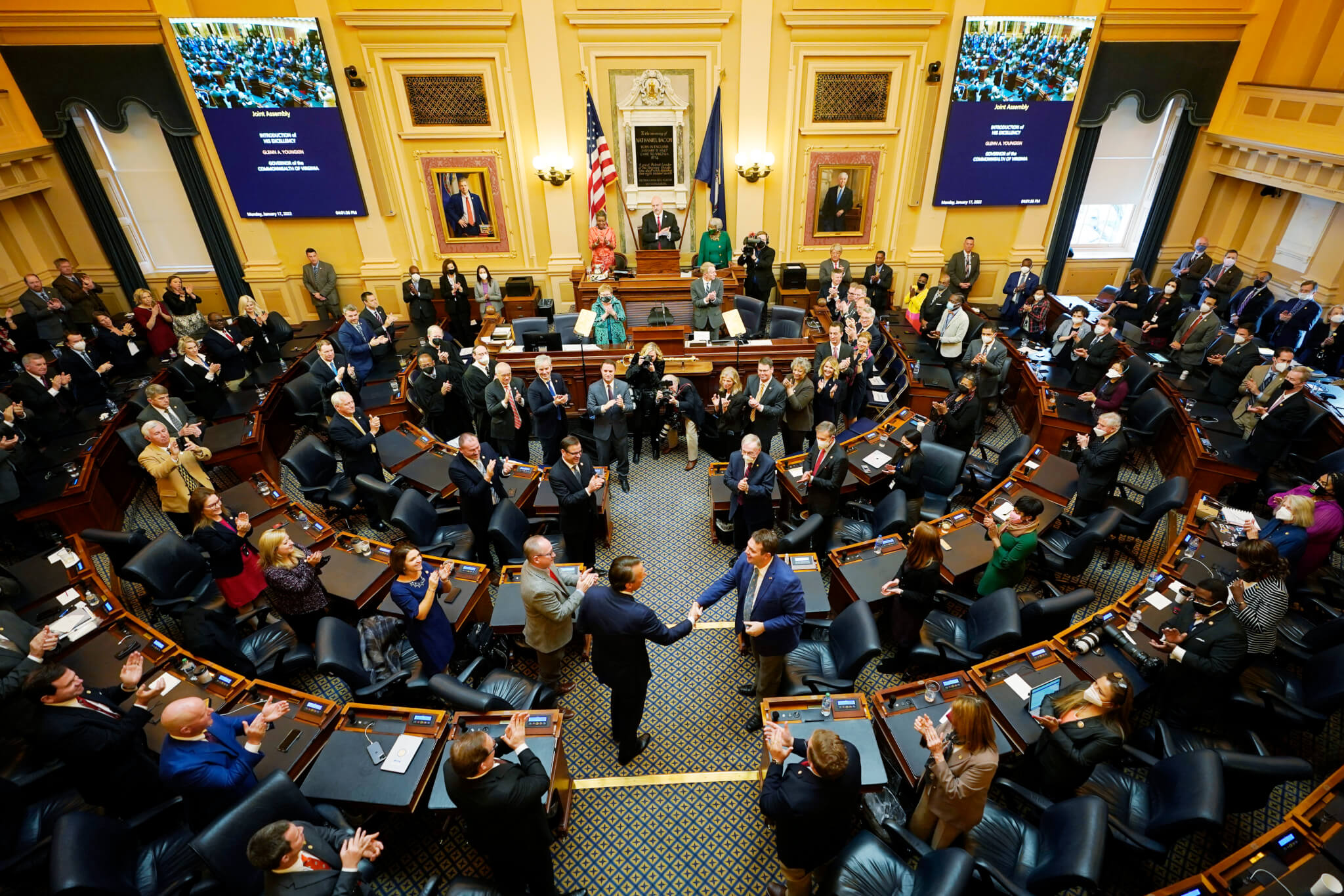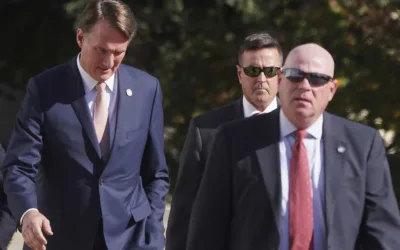
Virginia Gov. Glenn Youngkin, center, arrives to deliver his State of the Commonwealth address before a joint session of the Virginia General Assembly in the House chambers at the Capitol Monday, Jan. 17, 2022, in Richmond, Va. (AP Photo/Steve Helber)
The vetoes and amendments by Gov. Glenn Youngkin can be overridden by the General Assembly (GA) with a ⅔ vote in both chambers.
On Wednesday, April 27, Virginia’s lawmakers will reconvene in Richmond for a veto session to act on nearly 150 pieces of legislation that had been amended or vetoed by Gov. Glenn Youngkin.
A total of 26 bills that had bipartisan support that were vetoed by the governor will also be discussed when the GA reconvenes. None of the bills vetoed by Gov. Youngkin had been authored by Republicans.
Out of the 26 pieces of legislation that had been vetoed, nine were authored by State Senator Adam Ebbin, comprising a third of the bills vetoed by the governor.
“To be an effective governor, one has to be able to look at individual bills and actions and evaluate them one by one. I’ve never had a bill vetoed in my 19 years before,” Ebbin told The Virginia Mercury.
It’s not clear if Youngkin’s administration was trying to single out a specific lawmaker, but out of the pieces of legislation authored by Ebbin that were vetoed, the governor signed an identical House version, written by Republicans into law.
Senate Bill 389 (SB) would have gotten rid of a law that’s been on the books since the 1920s, that would require adult children to support their elderly parents, or be fined $500 or face up to a year in jail.
When asked about why he vetoed bills like SB 389, Youngkin told the Virginia Mercury “Given my signature to the companion legislation, [the] bill is no longer necessary.”
Other Vetoes
Also among the vetoed pieces of legislation is SB 706, which would prevent operators of heavy trucks from using cruise control or compression release brakes when driving in active wintry weather conditions, including snow, sleet, or freezing rain. The bill, which passed through the House with a vote of 94-4 and the Senate with a vote of 24-15, had bipartisan support. Legislation like it would have been incredibly useful in situations like what happened in January, when drivers — and Sen. Tim Kaine — were stuck on Interstate 95 for nearly 36 hours.
Another vetoed piece of legislation was House Bill 573 (HB), which would have put a statute of limitations of three years on the collection of medical debt. The legislation passed through the House with a vote of 88-11-1, and passed through the Senate with an amendment 40-0. The amended piece of legislation then passed through the House again with a vote of 87-9-1.
HB 802, authored by Del. Marcia Price was another bill that received a Youngkin veto. The bill in question was backed by both the Virginia Poverty Law Center and the Virginia Apartment and Management Association, and would’ve given localities the ability to take legal action against landlords that don’t address serious violations within a reasonable timeframe. Among the serious violations included? “A fire hazard or serious threat to the life, health, or safety of tenants or occupants.” Without the bill, judges will not be able to order landlord(s) to make the necessary repairs.
The Virginia Mercury has a larger recap about some of the other vetoed bills, and how Youngkin plans to “make his mark” on his first year as governor.
Included in Amendments
Gov. Youngkin amended more than 100 pieces of legislation before the deadline of April 11, when he had to sign any bills into law by. Many of the bills amended had one or two words changed, but there were serious changes to some of the pieces of legislation, including marijuana legalization and reform.
The Virginia Political Newsletter, authored by Brandon Jarvis, noted that one of the key bills that was amended by Youngkin was aimed towards a crackdown on the sale of a synthetic marijuana product known as Delta-8.
SB 591, the bill in question, modifies what the definition of “marijuana” would be. Included in the amendments? Making it a misdemeanor to have more than two ounces of marijuana. There is a penalty for possessing up to 16 ounces in the commonwealth, which is a $25 civil penalty.
Youngkin’s amendments would also allow full-spectrum CBD products to remain on shelves in the commonwealth, but be age-restricted to customers 21 and older.
He also made amendments to the controversial facial recognition legislation SB 741, to require more training and to establish the Virginia State Police as a potential resource for local law enforcement agencies who need to utilize the highly controversial technology.
History of First-Year Vetoes
Gov. Youngkin holds the highest veto total than any other governor in a first-year term. The last time that happened was in 1998, when then-Gov. Jim Gilmore vetoed 37 pieces of legislation.
To put things into perspective, the Virginia Public Access Project compiled the veto and amendment count for other recent governors.
- Ralph Northam had 20 vetoes — the second highest total in recent history — and 60 amendments in his first year of office.
- Terry McAuliffe had 10 vetoes, as well as 57 amendments in his first year.
- Republican Bob McDonnell had vetoed zero pieces of legislation in his first year, amending 123 pieces instead.
It is unclear whether or not budget talks will occur during the latest session of the General Assembly.
Janet Howell, Senate Finance Chair, said earlier this month that Youngkin’s vetoes actually set the General Assembly back when it comes to reaching an agreement on the state budget.

Here’s everything you need to know about this month’s Mercury retrograde
Does everything in your life feel a little more chaotic than usual? Or do you feel like misunderstandings are cropping up more frequently than they...

VIDEO: Check out Dogwood’s new merch line
Big news, Virginia! We've officially launched our Dogwood merch line 🎉 This year, we celebrate 5 years of bringing you Virginia news you can use....

VIDEO: Your support matters!
Your support matters! Donate today. @vadogwoodnews Your support matters! Visit our link in bio to donate today. #virginianews #virginia #community...

Op-Ed: Virginia’s new Democratic majorities pass key bills to improve your lives, but will Youngkin sign them?
The 2024 Virginia General Assembly regular session has wrapped up. It was a peculiar session from the outset, with Democratic majorities in the...

From the state rock to the state flower, here’s how Virginia got its symbols
Have you ever wondered why the Dogwood is the state flower? Or how the cardinal became the state bird? We’re here to answer those questions and more...

VIDEO: Second-gentleman Douglas Emhoff gives speech on reproductive freedom
Second gentleman, Douglas Emhoff touched on reproductive freedom not only being a woman's issue but "an everyone's issue" during the Biden-Harris...





